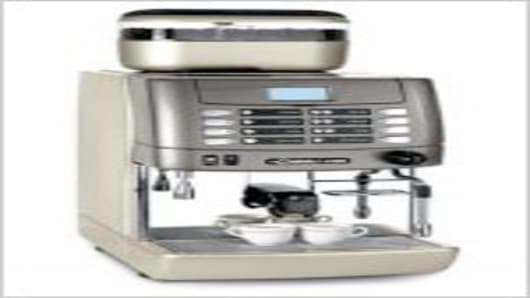The European Union is adding a job position: coffee monitor. The move is not part of the latest stimulus plan, but a fittingly tasteful settlement to a particularly European dispute.
The union’s executive office, the European Commission, was embarrassed when The International Herald Tribune reported last December that the commission had bought 21 deluxe espresso makers costing 5,000 euros each, then about $7,500.
The brouhaha over the coffee machines, which were just a year old at the time, provided new ammunition to critics who complain about wasteful spending in Brussels, where the union is based. At the time, the financial crisis and economic downturn were worsening, and companies and governments were beginning to preach about the need for fiscal discipline.
But the Italian maker of the machines was scandalized by something else: some of the most senior officials, their guests and employees complained that the coffee tasted bad, despite the machines’ pedigree.
Now, as part of the settlement with the maker, La Cimbali of Italy, the commission will receive not only new machines, but also training on their proper use, including for some of the European Union’s highest officials.
In a statement that could save face for La Cimbali, the commission hinted that the taste of the coffee might have been affected by the water in the Berlaymont Building, headquarters of the European Commission, and poor cleaning, rather than the quality of the machines.
“The water company has confirmed that water hardness can be quite variable,” said Dale Kidd, a commission spokesman. Softeners added to the water may have affected the coffee. Thus, “the new machines will be installed without water softeners, at least initially,” Mr. Kidd said.
The new machines are due to go into service on March 16.
La Cimbali is organizing training for a representative from each commissioner’s office to enhance their “coffee knowledge, from beans to the cup,” La Cimbali wrote in an “action plan” obtained by The Herald Tribune.
Officials, informal coffee monitors, will be taught “coffee tasting theory and sensorial techniques,” “recipes and hints,” and “ordinary machine maintenance procedures.”
Mr. Kidd said the company was “open to anyone who is interested in learning how to make an optimal espresso.”
And just in case they forget to perform the regular cleaning ritual the machines require, the company is programming each machine to clean itself periodically, “removing the need for someone to actively intervene,” Mr. Kidd said.
The commission has vigorously defended buying the machines, meant as a perk to keep top officials and visiting dignitaries from having to line up in cafes on other floors of the star-shaped Berlaymont Building.
Suspicions of problems were aroused when Alexander Just, an archivist at the commission, spent 70 euros of his own money to have water from the machines tested in his home country, Austria, because he and colleagues thought the coffee tasted peculiar.
The results showed high levels of nickel and elevated amounts of lead, prompting building supervisors to unplug the machines. The deluxe superautomatic coffee makers can grind the beans, select the quantity of milk and discard the spent coffee grounds, all at the touch of a button.
Additional testing found that the use of water softeners, apparently in the building’s water system or the pipes directly feeding the machines, may have contributed to the problems.
“The hardness of the water distributed in the area is quite variable and generally lower than what was expected,” Henrik Hololei, a commission staff member, wrote on Monday in a note to users of the machines.
In addition, a failure to clean the machines frequently enough had contributed “to some parts of the machines becoming slightly corroded, thereby allowing for more migration of metal substances,” Mr. Hololei wrote.
Luca Dussi, the operational marketing and communications director for Gruppo Cimbali, said on Tuesday he was not permitted to speak about the deal between the commission and the company. A lawyer representing Cimbali, Massimiliano Mostardini, said the “friendly agreement” was covered by “strict confidentiality obligations.”
He added, however, that the subsequent tests of the machines “have confirmed the high quality of such machines and that they are absolutely safe.”
(The dispute briefly degenerated into a court battle after Belgian authorities issued a short-lived health alert in Europe about the Cimbali machines. It was not clear whether the alert, which was lifted by a Belgian court late last year, had been prompted by problems at the commission or by separate complaints.)
Slideshows on CNBC.com
- Healthy Horizons: Fast Food Causes Concern
- Signs of the Times: Dry Cleaning Indicator
Under La Cimbali’s action plan, the company will take over the maintenance of the commission machines. It will also customize the machines to make them simpler to wash.
No evidence has been found of anyone’s getting sick from the coffee, but commission officials have been told that overexposure to nickel could cause skin problems or gastrointestinal disorders in people who have allergies. Mr. Hololei took additional steps on Monday to calm his colleagues.
“The medical service does not consider that the relatively short-term exposure to the nickel levels noted represents any risk to health,” he wrote.


